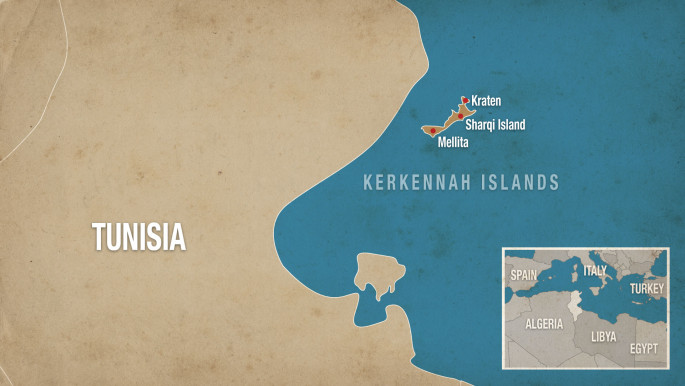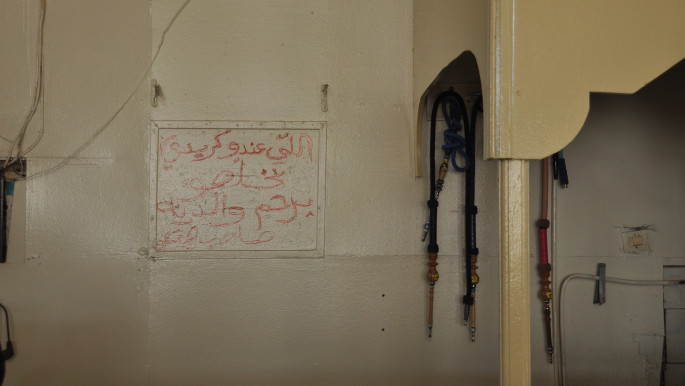Tunisia's Kerkennah Islands: A land for smuggling
At least 48 people were killed while 67 others were rescued by coastguards. The Tunisian Prime Minister called it a national tragedy, reminding all that illegal migration is still a dangerous issue.
This wasn't the first time a similar tragedy had taken place near the islands.
In October 2017, the Ministry of Defence issued a statement saying that one of its ships had collided with a small boat "carrying illegal migrants" off Kerkennah Island. Eight people were killed and 38 others were rescued.
Tunisia has become an important new route for migrants trying to make the crossing to Europe in the past year, particularly via the Kerkennah Islands.
Read also: Marginalisation driving Tunisians to migrant boats
Located around 330 kilometres south of the capital of Tunis, Kerkennah is widely known as one of the country's favourite tourist spots. But over the last few months, it has become a vital smuggling location for migrants seeking to reach Europe's southern shores.
 |
|
The capsizing of the boat in June highlighted how major the smuggling activity on the island is, opening a lucrative business that profits from the despair of migrants. Eight smugglers, all of them from Kerkennah, were linked to the tragedy.
The islands have become a vital departure spot, after Libya's well-known western shores came under intense scrutiny and tightened controls following reports showing sub-Saharan African migrants being sold as slaves in secret auctions.
The issue was brought to light by a CNN film crew, who secretly filmed one of the auctions taking place in Libya in late November 2017, causing shock and global condemnation.
European authorities in recent months have clamped down of cross-Mediterranean migration leaving people smugglers with hundreds of migrants in their hands. With nowhere to go, they were held by their captors in warehouses with barely enough food and water to survive. Others have been sold off in auctions.
Read also: Who is really responsible for Libya's slave trade?
Following the clampdown on Libya, waves of migrants have moved to the southern shores of Tunisia.
According to the latest figures by the International Organization for Migration (IOM), the number of Tunisians who reached Italy this year is set at 3,822 people. Authorities say they have stopped up to 6,369 people while attempting to illegally cross the Mediterranean Sea.
High unemployment and lack of police
Raoued, Amine, Mabrouk and Amir, in their 20's grew up on the island. All four are unemployed.
The New Arab meets them in the village of El Attaia, also known as the fishing village. Unlike the island's village of Ramla, El Attaia is now almost deserted with empty streets and only a few shops.
 |
|
| A sign in a coffee shop in the village reads: All those who have a credit to pay, please do for the sake of your parents [Massinissa Benlakehal] |
The rate of unemployment is high as the island seems to be abandoned by authorities in their eight-year post-revolution attempt to get the country back on track.
 |
These young people are desperate and see no future ahead of them in Tunisia |  |
Mabrouk and his friends sit outside a coffee shop, openly smoking weed, telling The New Arab about their very poor living conditions.
"Young Tunisians come from different regions of the country to take their chances trying to reach Italy by sea," says Amine. For him, these young people are desperate and see no future ahead of them in Tunisia.
Drugs are forbidden in Tunisia, but in Kerkennah, it's another story, as there are not many police authorities around.
"We can smoke whatever we want, even in the streets and no one can forbid it," says Mabrouk as he passes over the fresh joint to his friends.
 |
|
| There are not many police authorities around so youngsters smoking weed on the island is a common practice [Massinissa Benlakehal] |
The absence of police on the island and the lack of job opportunities has allowed smuggling networks to thrive on the islands.
"It's not just people being smuggled," one of the boys tells The New Arab. "Weapons and drugs are also being smuggled into the island."
Read also: Tunisia still has much democratic progress to make
According to the latest statistics, the North African country's unemployment rate is set at 15.4 percent, representing more than 600,000 people.
"Can you imagine that in an island like ours, there is no existing factory that can provide jobs for our young people," Zohir, a boat constructor who lives in the village. says, reacting to the significant unemployment rate.
"There is only a post office and tax office where residents give money instead of receiving it," he adds.
Tunisia is now seeing its own residents leave the country. So far this year Tunisia was the fourth country after Syria, Iraq and Guinea for nationals crossing into Europe, accounting for seven percent of arrivals, according to figures from the UN refugee agency, or UNHCR.
Experts said high unemployment rates, soaring prices, and the huge disparity between the rich and the poor have made young Tunisians gradually lose confidence in their country's future.
Tunisia has been suffering a deep economic crisis since the toppling of dictator Ben Ali in 2011, that threw Tunisia into chaos with unemployment and inflation springing up.
Follow him on Twitter: @mbenlakehal





 Follow the Middle East's top stories in English at The New Arab on Google News
Follow the Middle East's top stories in English at The New Arab on Google News


